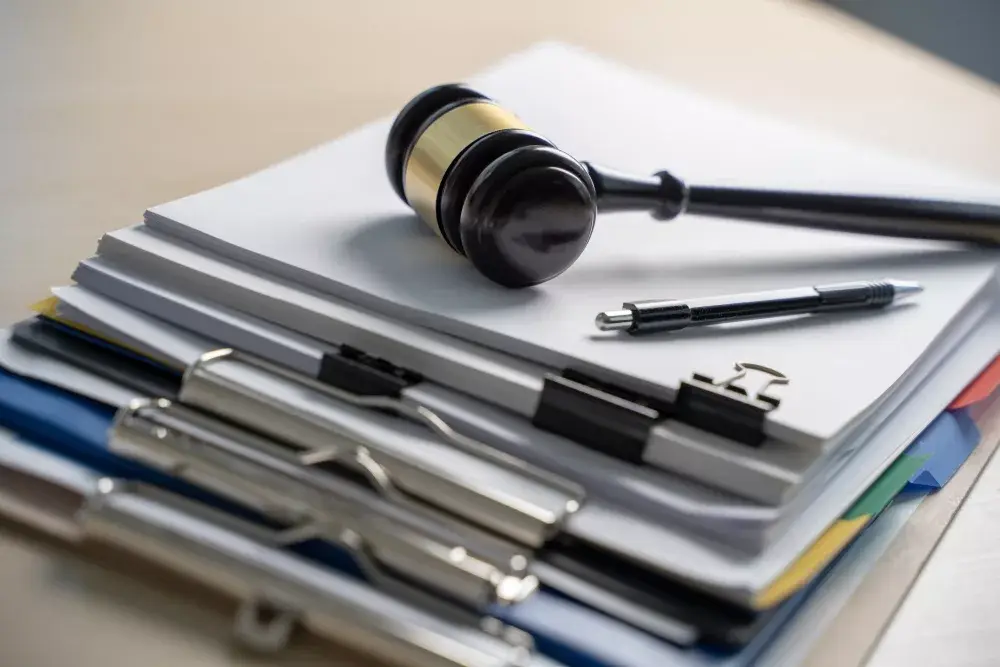An In-Depth Guide to Court Bonds | What Is a Court Bond?
Court bonds are a complex area to negotiate, particularly when you’re embroiled in legal proceedings. These guarantees secure the protection of all involved parties and help ensure compliance with court regulations. This comprehensive guide will break down exactly what court bonds are, their importance, how to obtain one and manage it effectively, from types of court bond types already available right through to options for those without an ideal credit score or looking at renewal processes. Discover everything needed here so that navigating this world can be done fearlessly!
Key Takeaways
- Court bonds are a type of surety bond that guarantee compliance with court orders and protect those involved in legal proceedings.
- They provide financial security, assurance, and protection for parties involved in legal disputes while upholding trust within the judicial system.
- Obtaining a court bond requires an application process, underwriting evaluation to determine cost & premium. Renewal typically begins 30-60 days prior to expiration or else may lead to costly repercussions.
Understanding Court Bonds

Court surety bonds, also known as court bonds or simply a court surety bond, are a type of guarantee that seeks to ensure compliance with orders from the courts and protect all parties involved in legal proceedings. Primarily designed to secure finances subject to any litigation proceeding or assure fulfillment of tasks mandated by the court, it is most common court bonds are usually necessary for someone seeking these assurances to get a specific kind of court bond called a “court surety”.
Three key players make up this dynamic: The person requesting the security (called principal), deceased person, those required such safety measures (obligee) and finally -the company providing protection against legal risks- being either an insurance underwriter entity or Surety Company. Knowing how each party affects one another can be fundamental when dealing with court sureties.
Types of Court Bonds
When it comes to court bonds, there are a variety of types. These can include appeal bonds, guardianship bonds, fiduciary/probate bonds and injunction ones. Each type is designed with its own unique purpose in the legal system. For example, by having guardianship bond set up by courts they ensure that any person the court appointed task them as guardian will take care of their ward’s rights and assets responsibly while protecting them at all times. a Probate bond or Fiduciary Bonds on the other hand offer Protection from losses due to failure fulfill duties towards anyone involved in regards to potential financial liabilities stemming from those commitments mandated by said court ruling. Knowing these various forms strengthens your knowledge when understanding how each operate within different scenarios pertaining within lawfulness boundaries!
Roles of Parties Involved
When looking at court bonds, there are three distinct parties involved. The principal is the individual who must acquire the bond in order to meet obligations set out by a third party, known as an obligee. A surety company is responsible for writing and distributing said bonds. For instance, a guardianship bond would require that the guardian act as principal. With courts taking on obligee duties whilst another surety company issues such bonds ensure they correspondences into fruition . Knowing everyone’s role within this process can give one a better understanding of how these court Bonds operate overall
The Importance of Court Bonds

Court bonds are integral in court proceedings as they guarantee that financial losses will be protected, duties fulfilled and trust upheld. Acting a type of assurance for plaintiffs and defendants alike, these security measures provide the necessary protection to ensure projects move forward without any fraudulent behaviors occurring. Not only do court bonds serve to protect potential litigants from incurring loss financially but judicial bonds also reassure courts owners about contractors fulfilling their commitments on time. In summary, by safeguarding funds liable for litigation or appointed obligations connected with judicial matters – court and judicial bonds represent a paramount role in preserving faithfulness within our legal system overall
Protection for Parties Involved
Court bonds provide assurance that parties to a legal conflict have some sort of financial protection, meaning all obligations will be met. This form of security can be divided into two types administrator bonds: judicial and other fiduciary bonds. Both offer peace-of-mind as they guard against potential risks or losses for those who are involved.
For instance, in cases where there is an estate being probated upon the death of someone. This type of probate bonds of bond guarantees beneficiaries their rights by making sure the executor meets his/her duties according to law– thereby creating assurance around fulfilling any liabilities whatsoever which may arise from such proceedings.
Ensuring Compliance with Court Rules
Court bonds are essential components of the legal system, as they guarantee parties abide by court orders and fulfil their obligations under law. An example is an attachment bond which secures payment of damages to defendants should a judgement go against them, assuring faith in proceedings and upholding justice. Such surety aids judicial systems’ running with little delay or complication. Strengthening its reliability through enforcement measures backed up by these important safeguards.
The Process of Obtaining a Court Bond

Obtaining a court bond requires an involved process, from applying to underwriting and determining the price of the premium. Those interested can either complete an online form or directly contact a surety company for this specific type of bond. Though each situation may have its own nuances when dealing with court bonds, having knowledge on how it all works is crucial in navigating through such matters successfully.
Application and Underwriting
In order to receive a court bond, applicants are required to provide personal and financial information that will be evaluated by the surety company during the underwriting process. Factors such as credit score, fiscal stability and character all factor into determining whether or not they would make an appropriate candidate for obtaining said court bond cost as well what premium is most suitable. This assessment assists in gauging how much risk there could potentially be associated with it.
Costs and Premiums
It is essential to understand the various elements that determine the price and premium of a court bond such as type, amount and credit score. Typically, these most common types of court bonds range from 1-10% or more depending on an individual’s credit rating. Those with scores lower than 700 can expect premiums exceeding 4%. Having this knowledge prepares applicants for successfully managing their financial obligations associated with obtaining a court bond.
Common Court Bond Scenarios

Court bond obligations are often a necessary part of different legal processes, such as estate and probate management as well the seizing or attaching property. To Understand their importance, let’s consider two typical cases in which court bonds may be required: managing estates through probate law. And dealing with seizure and attachment situations regarding properties.
Probate and Estate Management
Executor and administrator bonds, and guardianship bonds, which are types of a probate bond and estate management surety bonds, ensure that those managing estates adhere to their legal obligations. This provides security for the beneficiaries who may be affected if an executor or administrator breaches responsibilities due to mismanagement or fraud. If a valid claim is filed against such a bond then it will cover up until its set value, Any interests charges accrued by the principal must also be settled at this time. As such these forms of protection can provide assurance they will properly managed
Property Seizure and Attachment
When it comes to the guarantee of seized property, replevin bonds and attachment bonds are sure to maintain a safe safeguard. These financial instruments ensure that defendants will be compensated if court rulings come out in their favor while also preserving any taken possession from being sold or handled differently than its current state. This type of replevin bond also confirms that people’s rights are kept secure during cases involving legal action concerning possessions, with protection given through these securities staying true to justice and order within the judicial system. They make certain plaintiffs obey decisions made by courts for all involved parties’ benefit so as not reach an outcome contradictory to accepted norms seen through law enforcement procedures .
Managing Court Bonds with Bad Credit

For those with bad credit, getting court bonds can be difficult. Nonetheless, there are ways to obtain a bond even if the applicant has low credit scores. This includes using court surety bonds and programs meant for people in their circumstances as well as using collateral or co-signers for support when securing a court bond.
The next section will discuss these two options And provide helpful tips on how individuals struggling due to poor credits records might get an approved court bond quickly and efficiently.
Surety Programs for Bad Credit
Court bonds are attainable for those with a lower credit score through surety bonds and companies offering special bad-credit programs. Supporting documents and extra information is needed to show financial security, These applicants may face higher premiums due their record. Selecting a surety company which specializes in bond management related to low credit can help the process run smoothly so they can obtain what’s necessary.
Collateral and Co-Signers
Those with poor credit scores have the opportunity to increase their chances of obtaining a court bond by putting up collateral or having somebody co-sign attachment bonds for them. The latter being an individual that is willing to take over financial liability in place of the main borrower should they be unable to meet requirements set out by the surety company. Collateral serves as security and adds assurance, Decreasing risk for all parties involved when it comes to completing such bonds through courts.
Court Bond Renewal and Expiration

It is critical to be aware of the renewal and expiration timelines for court bonds, as failure to adhere can result in legal penalties. The following sections will delve into understanding this mechanism better including what may happen if a bond expires.
Maintaining compliance with any court-imposed requirements around these types of bonds is paramount when managing them, so knowledge about renewing appeal bond or letting one lapse could prove invaluable in preventing potential ramifications down the line.
Renewal Process and Timeline
The principal of a court bond is required to file an application for renewal approximately one or two months prior to the expiration date specific court bond. The surety company will then evaluate the request and may take into account any improvements in credit rating when calculating premiums, before deciding whether they can offer re-bond services or not. It is important that the holder remain aware of deadlines as well as other procedures associated with keeping their court bonds up-to-date and valid.
Consequences of Bond Expiration
If the executor bond principal does not renew or fails to extend a court bond, it can lead to legal penalties, economic losses and harm their reputation. The court could demand full payment of the amount posted as part of the executor bonds bond should they miss an appointed trial date or break any stipulations in said agreement.
Knowing what repercussions may follow if one of family members lets their bonds lapse gives them time for proactive renewal so they are able to avoid possible criminal and financial difficulties down-the-line.
Summary
This in-depth guide to plaintiff bond has provided a comprehensive overview of court bonds, their function, the importance they hold and how to obtain them. We have laid out the duties each party to plaintiff bond needs to fulfill as well explaining common cases that require such legal protection. We looked into obtaining bonding with bad credit scores which makes this article an indispensable read for those facing any kind of litigation matters.
Having gone through all these points you can now be more confident navigating in the complex realm involving court and judicial bond and situations so that you will remain protected legally whatever may come your way. Use what is covered here as power when undergoing judicial bond proceedings. Keep up to date on information and be guarded by knowledge acquired from reading this sourceful tutorial!
Frequently Asked Questions
How does bond work?
A bail bond is a surety agreement between the criminal defendant and a bondsman, where the former pays an amount of money to assure their presence in court. It acts as an alternative way for payment instead of paying out all at once. In case there’s any failure from the accused party to appear on time, then whatever collateral was laid down could be lost or worse still penalties may accrue according to terms agreed upon by both parties beforehand specific court bond.
What type of bonds are there in court?
Court bonds are guarantees issued in legal proceedings to guarantee that either the plaintiff or defendant can cover any costs associated with court action. Such obligations include an appeal bond, lis pendens and injunction bonds as well as a release of liens bond.
The purpose of these security measures is for both parties to ensure that damages caused by an ensuing trial will be adequately paid for – safeguarding them from financial losses should their court case end unfavourably.
What does bond order mean in court?
The court may grant a defendant their release prior to trial upon posting bail, which can take the form of cash or bond. This is known as an Order in Court, also referred to as Bond Order. The amount for bail must be set by the judge and this order allows the accused person’s freedom until they are required at trial.
Which bond is required by a court before allowing one to take the assets of another?
An attachment bond is required by a court before allowing one to take the assets of another to satisfy a legal obligation. This bond guarantees that any damage the defendant’s property suffered will be paid for if the action to attach another person’s property was wrong.
What is the primary purpose of court bonds?
Court bonds guarantee that court-ordered obligations are fulfilled in compliance with the law and safeguard any financial assets subject to legal action.



